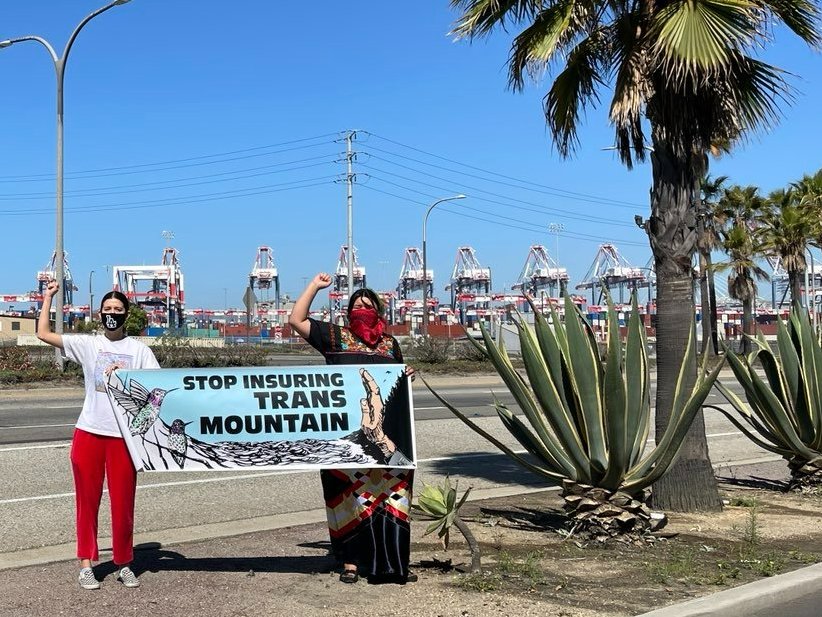Indigenous peoples in Canada and a coalition of environmental groups launched a “Global Week of Action” for June 14-21, aimed at pressuring an array of insurance companies to cut ties with a long-distance tar sands pipeline under construction in Canada.
On Wednesday, the Braided Warriors, an Indigenous youth group in British Columbia, held a rally in front of Chubb Insurance Canada in Vancouver, B.C. On Friday, activists in London are set to protest outside Lloyd’s of London — one of the world’s largest insurers of fossil fuels. Other acts of solidarity are planned as far away as the Pacific Islands and Sierra Leone.
The Indigenous and environmental groups are targeting the handful of global insurance companies that provide coverage for the Trans Mountain pipeline system, a long-distance pipeline running from Alberta’s tar sands to the Pacific Coast near Vancouver.
⚡️⚡️⚡️⚡️@IIYCfamily Indigenous youth from LA are demanding insurance companies stop insuring Trans Mountain at the Port of Long Beach as that is where nearly 50% of the oil from the Trans Mountain pipeline goes to by supertanker on the West Coast#StopTMX IIYC LA 📸 pic.twitter.com/TaNt45JQlh
— Insure Our Future U.S. (@Insure_Future) June 15, 2021
Youth in Kenema City Sierra Leone took to the streets to demand insurers drop trans mountain because of climate impacts on their community including recent flooding. pic.twitter.com/dVTmR3x8CI
— Insure Our Future U.S. (@Insure_Future) June 16, 2021
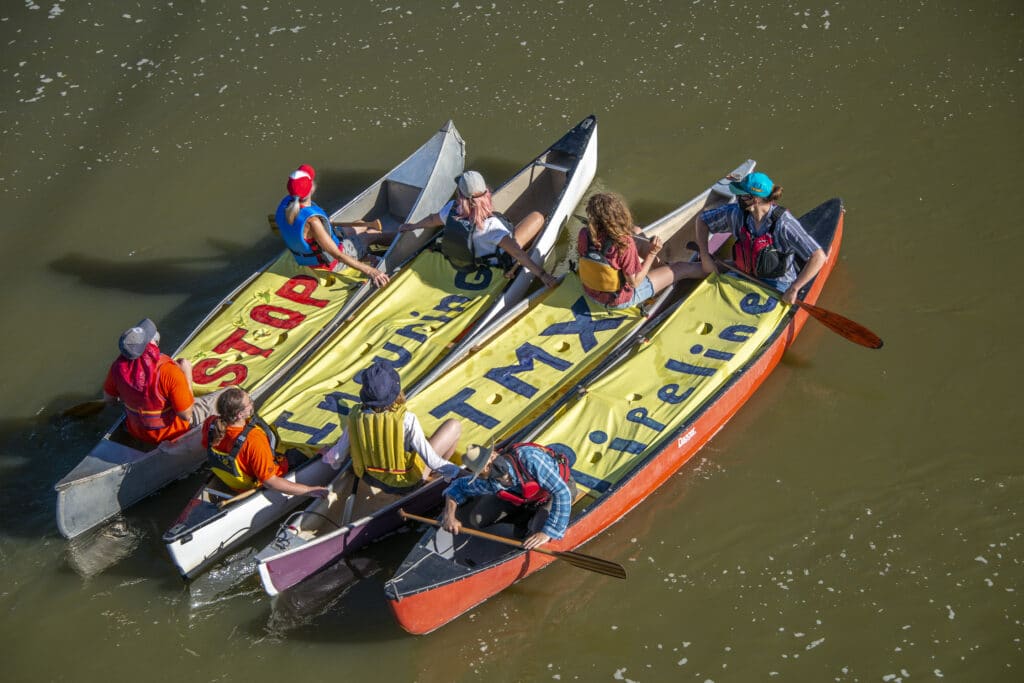
The original pipeline has been operating for decades, but Canada is building what has been termed a “twin” pipeline that would nearly triple the capacity of the existing system to 890,000 barrels of oil per day. For years the Trans Mountain Expansion struggled to get off the ground. It met intense resistance from multiple First Nations in British Columbia, and as it became ensnared in legal limbo, it grew into a financial boondoggle.
The former owner Kinder Morgan sought to bail on the project, and instead of letting it die, Prime Minister Justin Trudeau bought the system in 2018 for C$4.5 billion, effectively nationalizing it to keep it alive and push it forward.
Since then, the Trans Mountain Expansion has broken ground, felling trees and digging trenches along part of its 700-mile route. At the start of 2021, the project was roughly 22 percent completed, and despite the ballooning cost, is scheduled to come online at the end of 2022.
“The Trans Mountain pipeline and tanker project is an existential threat to Tsleil-Waututh Nation. It also fuels the climate crisis, which is a threat to us all. This is why Tsleil-Waututh Nation does not grant our Free, Prior, Informed Consent, and why we are calling on all insurance companies to drop Trans Mountain and recognize the violation of Indigenous rights as a material risk,” Charlene Aleck of the Tsleil-Waututh Nation Sacred Trust Initiative, said in a statement.
The Tsleil-Waututh Nation has lived on the Burrard Inlet in what is now Vancouver for millennia. The expanded pipeline system is estimated to result in a sevenfold increase in oil tanker traffic in the inlet. That would boost the number of tankers navigating the island-studded waters leading to the pipeline’s terminal from 60 per year currently to over 400 per year. A technical assessment conducted by the Tsleil-Waututh Nation found that there is a 79 to 87 percent likelihood of an oil spill in the inlet over a 50-year period.
Turning up the Pressure
But completion is not inevitable, and First Nations and environmental groups opposed to the project see the insurance industry as a key point of leverage. Without insurance, the pipeline cannot proceed.
DeSmog previously reported on the effort by First Nations and environmental groups to pressure global insurance companies to sever their ties with Trans Mountain, among other acts of resistance.
The campaign has proven to be partially successful thus far. In early June, Argo Group said it would stop insuring the pipeline when its policy expires at the end of August. “This type of project is not currently within Argo’s risk appetite,” Argo said in a statement to Insurance Journal.
Last year, other insurance giants — Zurich Insurance, Talanx, and Munich Re — also backed out. At least 14 major insurance companies have ruled out insuring the pipeline, according to Stand.earth, an environmental group pressuring the industry.
The shrinking pool of insurance is also part of a larger story. Greater scrutiny over the oil industry in general, and Canada’s tar sands in particular — some of the dirtiest forms of oil production — has led to a growing number of insurance companies restricting coverage to the sector.
“They’re standing on the wrong side of history. They should know and understand that the fossil fuel industry is in a state of demise. They shouldn’t be investing their funding into a dying industry that has proven itself to be incredibly destructive to the environment,” Grand Chief Stewart Phillip, president of the Union of British Columbia Indian Chiefs, told DeSmog, referring to the insurance companies backing the project.
Hey @AIG – are you ready to face the collective wrath of climate fighters everywhere? Better #StopTMX or expect our beautiful movement to hound you until you do! ✊#StopTheMoneyPipeline https://t.co/cRhfNRSq8I
— Coast Protectors (@CoastProtectors) June 15, 2021
Joe Seeger, an expert in insurance for oil projects, told the CBC that the number of large insurance companies providing coverage to Canadian tar sands has fallen roughly in half over the past decade. “It really is a supply and demand situation where we always go to our clients and have the bad news of [explaining there] are fewer insurers and we have to try to figure out new ways to do the business,” Seeger told the CBC in May.
The insurers that remain have tightened up their offerings. The major insurers in London have restricted the amount of coverage for tar sands operations to just $200 million, according to Willis Towers Watson, an international insurance broker. As recently as 18 months ago, those companies would offer $500 million in coverage.
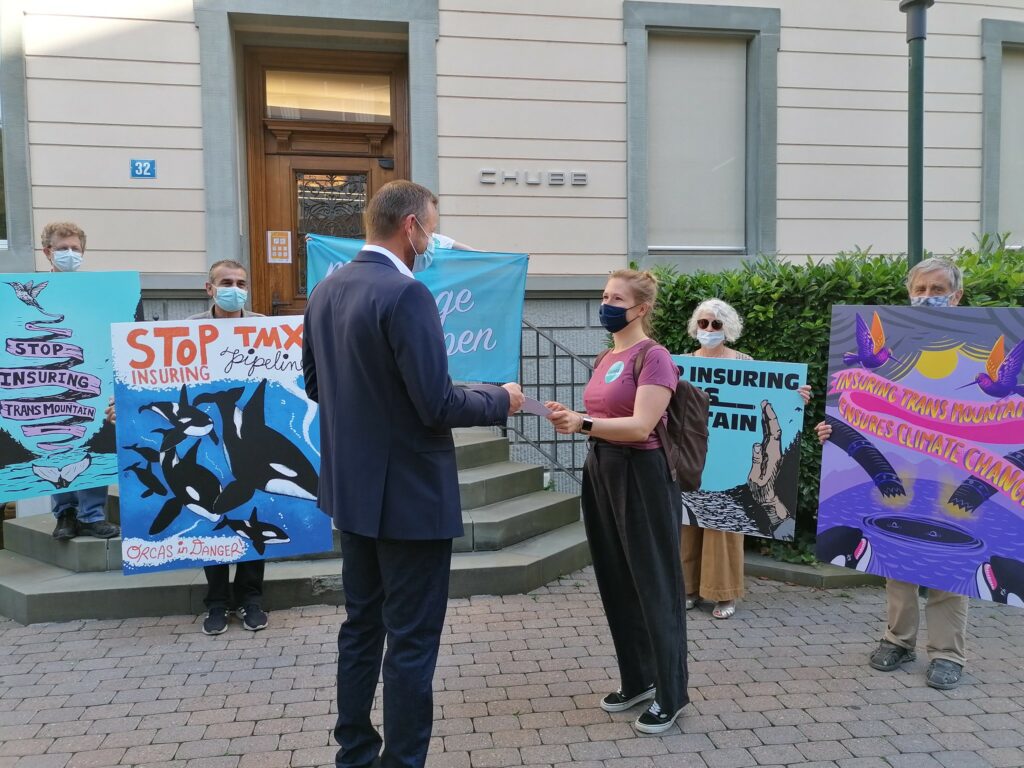
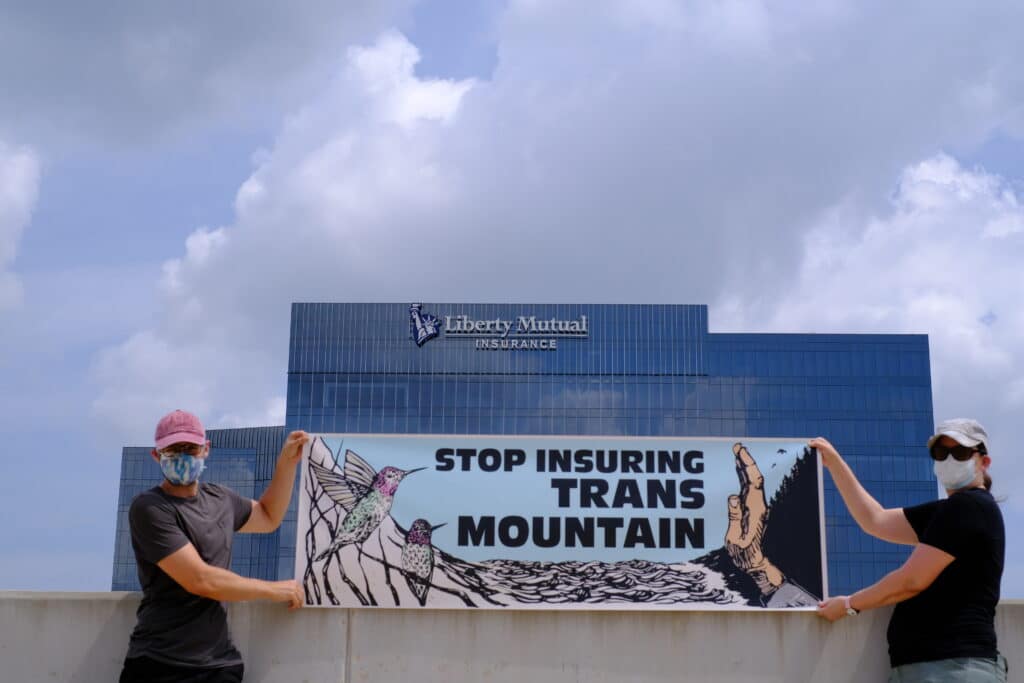
The pressure from activists and First Nations apparently had enough of an impact on the project that Trans Mountain appealed to the Canada Energy Regulator in February to allow them to keep the names of its insurers secret.
In its application, Trans Mountain said that “insurance companies have faced negative pressure for insuring the Trans Mountain Pipeline” and that Trans Mountain “experienced a significant reduction in available insurance capacity” in 2020. If the growing pressure from activists continues, the pipeline operator said, it would “likely result in material loss to Trans Mountain.”
The federal regulator agreed and allowed the insurers to remain confidential. “It’s a troubling example of Trans Mountain’s culture of secrecy and attempts to evade transparency and accountability to its owners, which are the Canadian taxpayers,” Elana Sulakshana, an energy finance campaigner with Rainforest Action Network, told DeSmog.
DeSmog reached out to eight insurers that are thought to be the remaining companies backing the Trans Mountain system — AIG, Chubb, Energy Insurance Limited, Liberty Mutual, Lloyd’s, Starr, Stewart Specialty Risk Underwriting, and W.R. Berkley. AIG declined to comment and the rest did not respond.
Trans Mountain did not respond to a request for comment.
“The key companies that were insuring the project last year have yet to cut ties and for the most part have not commented publicly on their support for the project. And that’s why we’re having this week of action, to ramp up the pressure and keep the public scrutiny on them so that they are forced to respond,” Sulakshana said.
A ‘paradigm shift‘
Even as the Trans Mountain Expansion is proceeding without the consent of some First Nations, there is something of a reckoning unfolding at the moment in Canada surrounding its relationship with Indigenous communities.
Both British Columbia and the Canadian parliament are moving legislation forward that would align provincial and federal law with the principles laid out in the U.N. Declaration on the Rights of Indigenous Peoples (UNDRIP), an attempt at some form of reconciliation. On June 16, the Canadian Senate passed the bill.
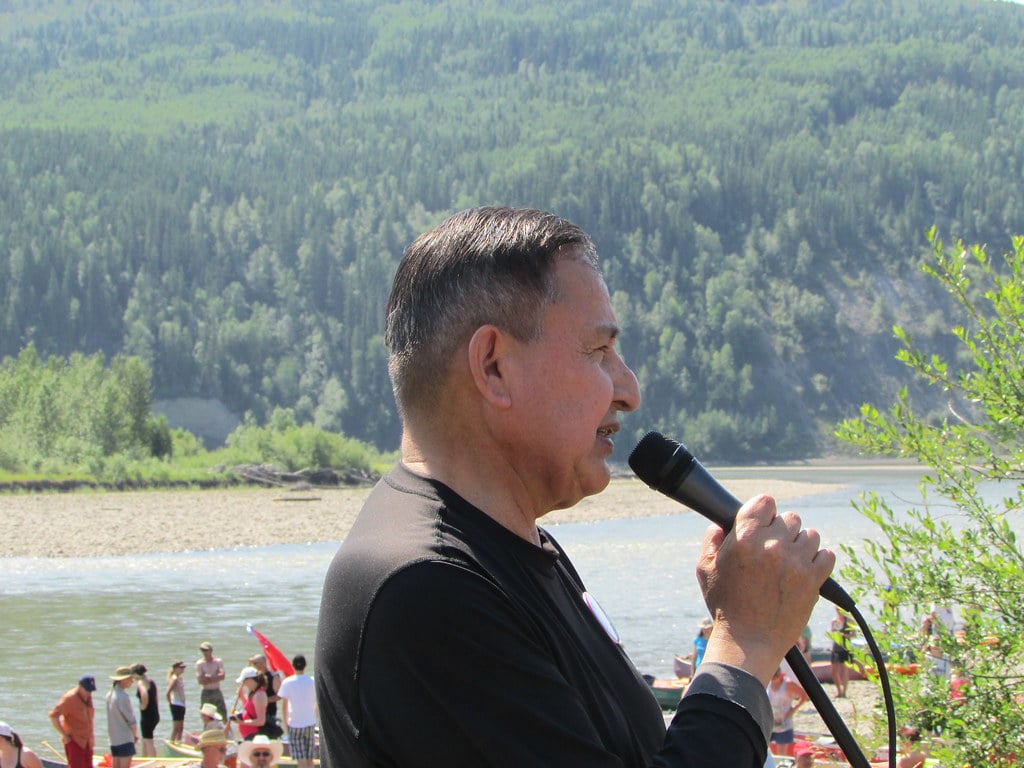
The practical impact is unclear as of yet, but the legislation is a “paradigm shift,” according to Grand Chief Stewart Phillip, potentially shifting more power to First Nations when it comes to resource extraction on Indigenous lands.
“We have a federal bill and a provincial bill that seeks to send a strong message to governments at all levels, to industry, business — that it’s a new day,” he said.
But he doesn’t expect the legislation to defuse simmering tension in British Columbia. “We’re expecting to hear the usual racist backlash from industry,” Phillip said. He pointed to the epidemic of Missing and Murdered Indigenous Women and Girls (MMIWG), concerns about racialized violence, and also the recent revelation that the remains of 215 children were found on the grounds of the Kamloops Indian Residential School, one of many schools that forcibly sought to assimilate Indigenous children and which operated until the late 1970s. The discovery made national, and indeed, international headlines.
“It’s a very, very volatile situation here in British Columbia,” Phillip said. And the construction of the Trans Mountain Expansion “could be a flashpoint, no doubt about it.”
But opposition to the pipeline continues. “This resistance has been consistent and unrelenting,” Phillip said. “We intend to continue to vigorously oppose TMX [Trans Mountain Expansion] until it’s dead.”
Subscribe to our newsletter
Stay up to date with DeSmog news and alerts


